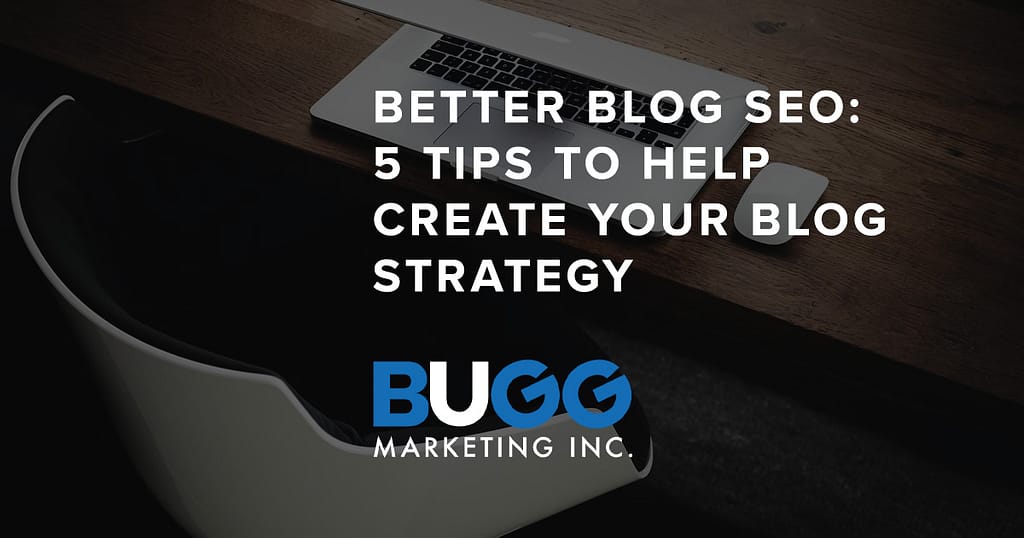Better Blog SEO – 5 Tips to Help Create Your Blog Strategy

The purpose of creating a blog is to provide information to users who are looking for help answering questions. This will, in turn, provide opportunities for search engines to index your article to provide relevant content. With intentional focus on creating better blog SEO, your content will be exposed to more users.
Here are a few simplified and helpful tips to grow your blog. You can increase your brand with more users visiting your website.
Learn the basics of blog SEO. You’ll be glad you did.
Whether you’re creating a small, personal blog or developing a large, corporate content strategy, understanding the basics of better blog SEO is essential. It’s more than writing an article, publishing it and hoping for the best. It’s about understanding how to focus the blog content on your keyphrase or keywords. You need to understand the relationship between the users and the journey they took to find your content. Understanding basic SEO principles is important for your article to start off on the right foot. Chances are, you’re reading this article because we created this content using proper SEO techniques for you to find this article.
Here are some links to understand how search engine optimization works and how you can benefit from better blog SEO:
- The Beginner’s Guide to SEO
- Core Principles of SEO
- Search Engine Optimization (SEO) Starter Guide
Create Content That Works for Both Search Engines and Users
It’s very easy to get carried away with over-optimizing your blog content. With too much search engine optimization, it can get to the point of sounding unnatural. Google, and most other search engines, need to recognize that the content can be read easily and doesn’t sound like a robot wrote it. The common practice is to write your content so a person in Grade 8 can understand it.
Although SEO is intended to help the search engines find your blog content more easily, search engines are also smart enough to determine if the content has been over-saturated with keywords. Based on your keyword research, are you selecting a topic that users are actually searching for? If you’re wanting to increase to a wide reach, will your blog content be inclusive of everyone?
At BUGG Marketing Inc., we’ve developed digital content strategies since 1994 that search engines are attracted to. Our practice is to keep things simple, understandable and concise.
Track Your SEO Metrics
Once you’ve created your content and published it, your job is not done. How do you know if your hard work has paid off? You need to determine goals for the page. You need to track user access to that content to confirm your desired keywords are actually working as expected. If things aren’t working, you need to make adjustments.
You can follow the success of your blog by monitoring user details in your website analytics. Many websites use Google Analytics as a tool to track users. Understanding landing pages, time on site, bounce rates, and following the user path in your site will help you understand how your content has been consumed.
Link Your Pages Properly So Link Equity Is Spread Out
Link equity is the importance that Google indexing places on the directly linked content within the article. This can be both internal links or backlinks from other websites.
So, if you have a blog article that has 50 backlinks and another with 3, the latter page will not rank as well as the one with more “juice” to it. Google values that your content is being linked to so, the more valid and strong links, the better. If your page with the 50 backlinks is directly linked to the one with only 3 links, that will be a benefit to the lesser backlinks page. It may sound complicated, but it’s all about Google understanding what is valuable and popular so it knows how to rank it.
The same concept works with internal linking within your website. If you have a page that no other page is linking or referring to, Google will think that page isn’t valuable and may not rank it as high or at all.
Flatten Your Blog
In simple terms, put time into categorizing your blog posts properly. Your site architecture, how the pages are arranged, will determine the importance of your website’s content. Larger sites with lots of content tend to water down link equity because search engines will rank higher level pages as more important. Here is a good outline on how to manage your pages with a content hierarchy:
- Home Page
- Category Pages
- Subcategory Pages
- Detail Pages
- Subcategory Pages
- Category Pages
With most site configurations, link equity will tend to move to the top pages because most other sites will be linked to them. However, with blog posts, this is reversed.
For better blog SEO, it’s important to firstly understand the basics of how search engines work. Subsequently, there are technical aspects to how the get your article seen by search engines. Once those technical issues have been addressed, you’re now able to edit, manage and monitor your content to ensure your content ranks as expected.
If you have any questions on how BUGG Marketing Inc. can help you with your blog strategy, please feel free to connect with us. You can reach us by filling out this short form by clicking here.
408 - 55 Water St.
Office 8298
Vancouver, BC, V6B 1A1, Canada
P: 604-339-8127
E: Let's Connect
We offer the following digital marketing services: Langley SEO company, Surrey Search Engine Marketing, digital marketing consultant, Abbotsford digital marketing.

